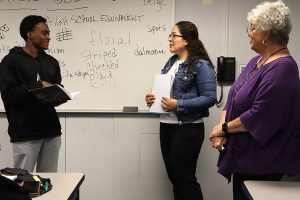Recommended AA Transfer Curriculum for Education
To teach in Illinois public schools (elementary or secondary), teachers must be certified by the State of Illinois. To transfer into an approved baccalaureate program in education as a junior, students must complete a minimum of 60 semester credits. Since admission is competitive, completion of the recommended courses does not guarantee admission. Community college students are strongly encouraged to complete an Associate’s degree prior to transfer. Students should be aware that a minimum grade point average of 2.25 (and for some universities 2.5) on a 4.0 scale is required for program admission, and passage of a basic skills (reading, writing, grammar, and math) test is also required.
Students complete either an AA or an AS degree, dependent upon their area of concentration. For example, Mathematics, Biology, Chemistry or Physics students should complete an AS degree. For most other areas of concentration, an AA degree is appropriate. Certification requires more credits in general education than either the AA or AS degree. The numbers underlined indicate the number of credits required in each general education category for certification. Students are not expected to complete all of their general education certification requirements before transfer. Students should consult the College & Career Success Center for help in selecting courses appropriate for the program at the college or university where you plan to transfer.
Faculty are available during scheduled office hours to advise students about courses and programs. Peruse the related offerings in the Department of Human Services.
All full-time transfer students are required to take OCS 121.
Overview for College Success
Overview for College Success (OCS 121) is a course designed to assist students in the navigation of becoming successful in college and life. Major topics include setting academic, career and personal goals; effective communication strategies; study skills; critical thinking; self-discovery; and learning styles. In addition, this course delves into topics such as stress management, diversity and other well-being topics. Students will develop educational and career plans, learn to utilize college resources and receive extensive help in course planning. OCS 121 credit is not calculated in the course minimum credit totals listed in this section.
Students must take OCS 121 if they meet one or more of the following:
- First time degree seeking students.
- Transfer student with less than 12 credit hours and no evidence of similar course on transcript.
- Registering for 6 or more credits.
- Test into 2 or more developmental classes.
- Currently does not have OCS credit or registered for OCS.
Minimum General Education (42-45)
| Overview for College Success | CREDITS | |
|---|---|---|
| OCS 121 | Overview for College Success | 1 |
| Communications (9) | ||
|---|---|---|
| ENG 101 | Composition and Rhetoric | 3 |
| ENG 102 | Composition and Research | 3 |
| SPE 108 | Oral Communication | 3 |
| Humanities and Fine Arts (9) | ||
| GROUP II | Select One Literature Course from Humanities Electives Students earning an Associate degree must meet the requirement for coursework on improving human relations as defined in Public Act 87-581. |
3 |
| GROUP II | Select ONE Fine Arts course from Humanities Electives Students earning an Associate degree must meet the requirement for coursework on improving human relations as defined in Public Act 87-581. |
3 |
| GROUP II | Select ONE Humanities or Fine Arts course from Humanities Electives Students earning an Associate degree must meet the requirement for coursework on improving human relations as defined in Public Act 87-581. |
3 |
| Social and Behavioral Science (9) | ||
| At least one 3-semester-hour course must be taken in non-Western or Third-World cultures from either the Humanities or Social Science. | ||
| HIS 203
HIS 204 |
Early American History OR Later American History |
3 |
| PSC 101 | American National Government | 3 |
| PSY 101 | Introduction to Psychology | 3 |
| Mathematics (3 – 5) | ||
| For Elementary Education: | ||
| MTH 145
MTH 146 |
Math Concepts & Structures I AND Math Concepts & Structures II MTH 145 credit hours (4) will be applied to the area of concentration. |
4 |
| For Secondary Education: Select ONE from: |
||
| MTH 126
MTH 161 MTH 180 MTH 190 MTH 211 |
Fundamentals of Statistics OR Finite Mathematics OR Calculus for Business and Social Science OR Calculus and Analytic Geometry I OR Introductory Statistics |
3-5 |
| Physical and Life Sciences (7 – 8) | ||
| GROUP V | Select One Life Science Course from Physical and Life Sciences Electives AND Select One Physical Science Course from Physical and Life Sciences Electives At least one of the Physical and Life Sciences Elective courses must be a lab course. |
3-4
3-5 |
Area of Concentration/Electives (16 – 19)
Select 16 to 19 hours, with at least 9 hours in one of the following Academic Disciplines:.
| English/Language Arts, Music, Social Science, or Foreign Language | 16-19 | |
| Professional Education Courses (6) Students will take the majority of professional education courses as juniors and seniors after transfer to the four-year institution. Courses in the Teacher Aide program (CHD) are not designed for a transfer degree and generally do not transfer. Some colleges accept internship course CHD 211 as elective credit and apply the hours toward the fulfillment of the pre-clinical experience; others do not. However, students who are unsure of their career choice may wish to take this course for exposure to classroom experience. EDU 204 and CHD 203 also transfer to some colleges. Consult the Transfer Center for specific information about course transferability. |
||
| EDU 110 | Foundations of American Education | 3 |
| PSY 211
CHD 104 CHD 203 |
Human Growth and Development (Life-span) OR Child Growth and Development OR The Exceptional Child |
3 |
| Minimum for AS Degree | 62 | |
|---|---|---|




